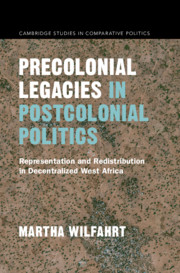 Precolonial Legacies in Postcolonial Politics
Precolonial Legacies in Postcolonial Politics Chapter 1 articulates the theory of institutional congruence. I argue that persistent forms of social cooperation at the grassroots are revitalized following institutional reform because some communities have inherited robust social institutions that stipulate appropriate social behavior. I elaborate on the theory’s dual mechanisms of shared social identification and dense cross-village network ties to illustrate how institutional congruence helps local elites navigate the two-level political game introduced by decentralization: local elected officials face pressure within their villages on a first level that are not always compatible with their incentives at the second level of the local state itself, where they must negotiate with other elites from other villages. When shared social institutions stretch across the many villages of a local government, elites find it easier to negotiate at the second level of the local state because these social institutions reorient them toward group-based goals. As a consequence, local representation and redistribution is expected to be broader across space under conditions of high congruence, but contentious and targeted when it is low.
To save this book to your Kindle, first ensure [email protected] is added to your Approved Personal Document E-mail List under your Personal Document Settings on the Manage Your Content and Devices page of your Amazon account. Then enter the ‘name’ part of your Kindle email address below. Find out more about saving to your Kindle.
Note you can select to save to either the @free.kindle.com or @kindle.com variations. ‘@free.kindle.com’ emails are free but can only be saved to your device when it is connected to wi-fi. ‘@kindle.com’ emails can be delivered even when you are not connected to wi-fi, but note that service fees apply.
Find out more about the Kindle Personal Document Service.
To save content items to your account, please confirm that you agree to abide by our usage policies. If this is the first time you use this feature, you will be asked to authorise Cambridge Core to connect with your account. Find out more about saving content to Dropbox.
To save content items to your account, please confirm that you agree to abide by our usage policies. If this is the first time you use this feature, you will be asked to authorise Cambridge Core to connect with your account. Find out more about saving content to Google Drive.